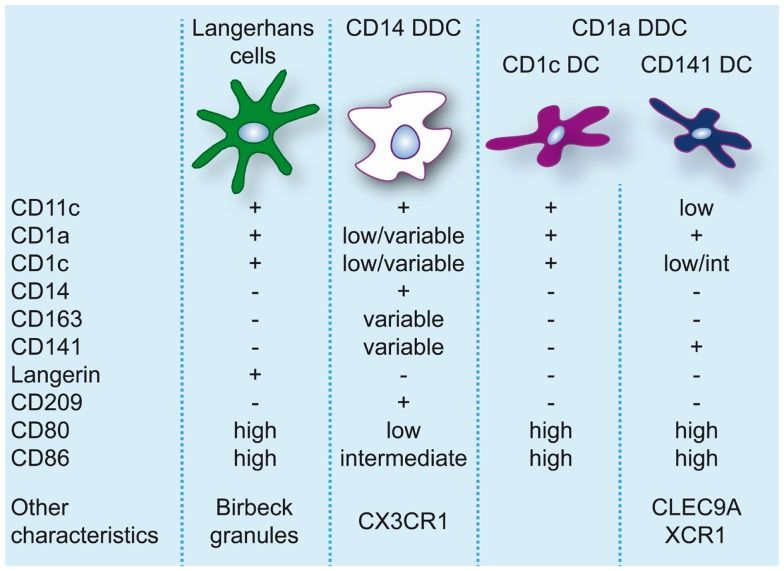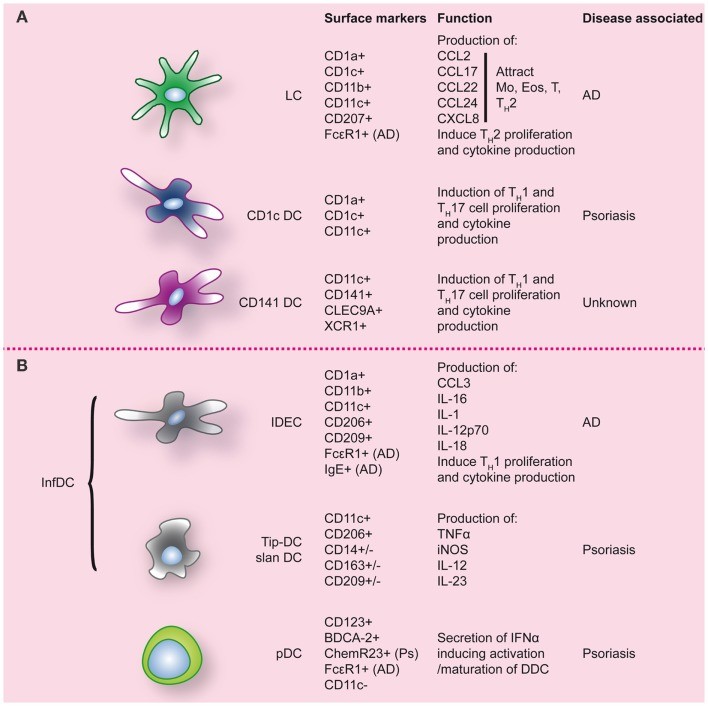CD Antigen (Dendritic Cell Lineage Markers)
Related Symbol Search List
Immunology Background
Available Resources for CD Antigen (Dendritic Cell Lineage Markers) Research
Creative BioMart is a leading provider of resources and services dedicated to CD antigens (dendritic cell lineage markers). Our platform offers researchers a wide range of high-quality products, tailored services, and technical support to advance scientific knowledge and contribute to the development of novel therapies
Our comprehensive list of CD antigens (dendritic cell lineage markers) includes well-known markers such as CD14, CD4, CD16a, FCGR3B, FCGR4, TLR3, TLR4, LIGHT, and many more.
- Our products include antibodies, recombinant proteins, protein pre-coupled magnetic beads, cell and tissue lysates, chromatography reagents, and other kits.
- We also provide customized services tailored to meet specific research needs. Our team of experienced scientists offers custom antibody development, protein engineering, recombinant antigen production, and assay development services.
- We also provide a wealth of resources to support CD antigens (dendritic cell lineage markers) research. Our platform includes information on involved pathways, protein functions, interacting proteins, related articles, research areas, and other relevant topics.
Our Featured Products
| Cat.# | Product name | Species | Source (Host) | Tag |
|---|---|---|---|---|
| CD4-2219H | Recombinant Human CD4, Fc-His tagged | Human | Human Cell | Fc/His |
| CD14-613H | Recombinant Human CD14 protein, hFc-tagged | Human | HEK293 | hFc |
| Tlr3-3079M | Recombinant Mouse Tlr3, His tagged | Mouse | Insect Cell | His |
| TLR4-296H | Active Recombinant Human TLR4/LY96 Complex Protein, His-tagged | Human | Mammalian cells | His |
| FCGR3B-3869H | Recombinant Human FCGR3B protein(Met18-Gly193) | Human | E.coli | N/A |
| Fcgr4-3996M | Active Recombinant Mouse Fcgr4 protein, His-Avi-tagged | Mouse | HEK293 | His-Avi |
About CD Antigen (Dendritic Cell Lineage Markers)
CD antigens, also known as clusters of differentiation antigens, are widely used as lineage markers to identify and characterize different cell types, including dendritic cells (DCs) and their specific subsets. These cell surface molecules provide valuable tools for distinguishing DCs from other immune cell populations and for studying their development, differentiation, and functional properties. Here is an introduction to CD antigens commonly used as lineage markers for dendritic cell populations:
- CD11b: CD11b is another marker often used in combination with CD11c to identify specific subsets of dendritic cells. It is a subunit of the integrin receptor complex Mac-1 and is expressed on myeloid cells, including certain subsets of conventional dendritic cells.
- CD123: CD123, also known as the interleukin-3 receptor alpha chain (IL-3Rα), is expressed on plasmacytoid dendritic cells (pDCs), which are specialized in producing type I interferons in response to viral infections.
- CD141 (BDCA-3): CD141 is a specific marker for a subset of human dendritic cells known as BDCA-3+ DCs. These DCs are characterized by their ability to cross-present antigens to CD8+ T cells and are typically found in lymphoid tissues and peripheral blood. CD141 is used to distinguish BDCA-3+ DCs from other DC subsets.
- CD303 (BDCA-2) and CD304 (BDCA-4): CD303 and CD304 are markers for plasmacytoid dendritic cells (pDCs). CD303, also known as BDCA-2, is expressed on the surface of pDCs and is used to specifically identify this subset. CD304, also known as BDCA-4 or neuropilin-1, is highly expressed by pDCs and is often used in combination with CD303 to distinguish pDCs from other immune cell types.
- CD14: CD14 is predominantly expressed on monocytes and macrophages, but it can also be found on a subset of DCs called inflammatory DCs. Inflammatory DCs share some characteristics with monocytes and are involved in the initiation and regulation of immune responses.
- CD4: CD4 is a well-known marker for helper T cells; however, it can also be expressed on a subset of DCs called CD4+ DCs. CD4+ DCs have an enhanced ability to capture antigens and stimulate T cell responses, contributing to immune activation.
- CD16a (FCGR3A): CD16a, also known as Fc gamma receptor IIIA, is primarily associated with natural killer (NK) cells and macrophages. However, a subset of DCs termed CD16a+ DCs has been identified in some tissues, such as the skin. CD16a+ DCs have been implicated in immune responses and may have unique functional properties.
- TLR4: Toll-like receptor 4 (TLR4) is mainly associated with recognizing bacterial lipopolysaccharide (LPS). DCs express TLR4 and play a crucial role in initiating immune responses against bacterial pathogens. TLR4 signaling in DCs leads to the production of pro-inflammatory cytokines and activation of adaptive immunity.
- LIGHT (CD258): LIGHT is a member of the tumor necrosis factor (TNF) superfamily. It is expressed on various immune cells, including DCs. LIGHT plays a role in immune cell activation, lymphoid tissue development, and immune regulation. Its interaction with receptors on DCs can influence DC maturation and T cell responses.
These are just a few examples of CD antigens commonly used as lineage markers to identify and characterize different subsets of dendritic cells. The expression of these markers helps researchers differentiate DC populations from other immune cells and study their specific functions, interactions with other immune cells, and contributions to immune responses. It is important to note that the expression of CD antigens can vary depending on the species, tissue, and activation status of dendritic cells, and a combination of multiple markers is often used to define distinct DC subsets accurately.
 Fig.1 Dendritic cell populations in human skin during steady-state conditions. Expression levels of markers commonly used to identify and discern these populations are indicated. (Boltjes A, et al., 2014)
Fig.1 Dendritic cell populations in human skin during steady-state conditions. Expression levels of markers commonly used to identify and discern these populations are indicated. (Boltjes A, et al., 2014)
Contribution of CD Antigen (Dendritic Cell Lineage Markers) to the Immune Response
DCs are professional antigen-presenting cells that bridge the innate and adaptive immune systems. They capture process, and present antigens to T cells, thus initiating and shaping immune responses. CD antigens expressed on dendritic cells contribute to various aspects of the immune response, including antigen recognition, activation, and regulation of immune cells.
- Antigen Recognition and Uptake: Dendritic cells express several CD antigens that facilitate antigen recognition and uptake. For instance, CD11c and CD11b are involved in cell adhesion and migration, enabling dendritic cells to interact with antigens present in peripheral tissues. This allows dendritic cells to capture antigens through various mechanisms such as phagocytosis, receptor-mediated endocytosis, and macropinocytosis.
- Antigen Processing and Presentation: Dendritic cells process captured antigens into smaller peptides and present them in the context of major histocompatibility complex (MHC) molecules. CD11c, CD80, CD86, and CD40 play important roles in antigen presentation. CD11c helps in the efficient trafficking of MHC molecules to the cell surface, while CD80 and CD86 provide co-stimulatory signals required for effective T cell activation. CD40 on dendritic cells interacts with CD40L on T cells, enhancing antigen presentation and T cell activation.
- T Cell Activation: Dendritic cells are specialized in priming and activating naive T cells. CD80, CD86, and CD40 expressed on dendritic cells engage with their respective receptors on T cells, providing essential co-stimulatory signals required for T cell activation and differentiation. This interaction promotes T cell proliferation, cytokine production, and the generation of effector T cell subsets, such as cytotoxic T cells or helper T cells, depending on the context of the immune response.
- Immune Regulation: Dendritic cells also contribute to immune regulation and tolerance. Certain CD antigens on dendritic cells, such as CD80 and CD86, can induce regulatory T cell (Treg) differentiation, which helps maintain immune homeostasis and prevent excessive immune responses. Dendritic cells can also induce T cell tolerance through mechanisms such as presentation of self-antigens in the absence of co-stimulatory signals.
- Cytokine Production: Dendritic cells produce various cytokines and chemokines that influence the immune response. CD83, a marker for mature dendritic cells, is involved in cytokine production and modulation of T cell activation. Dendritic cells secrete cytokines like interleukin-12 (IL-12), IL-10, and type I interferons, which influence T cell differentiation, polarization, and effector functions.
These processes are vital for initiating and modulating immune responses, regulating immune tolerance, and orchestrating appropriate immune reactions against pathogens, tumor cells, or self-antigens.
 Fig.2 Dendritic cell populations in human skin during inflammatory conditions. Inflamed skin contains not only DC that were already present at steady-state (A), but also DC that migrated into the skin (B). Markers commonly used to identify these DC populations are indicated, as well as markers/function associated with specific inflammatory conditions of the skin. (Boltjes A, et al., 2014)
Fig.2 Dendritic cell populations in human skin during inflammatory conditions. Inflamed skin contains not only DC that were already present at steady-state (A), but also DC that migrated into the skin (B). Markers commonly used to identify these DC populations are indicated, as well as markers/function associated with specific inflammatory conditions of the skin. (Boltjes A, et al., 2014)
If you have any questions, requirements, or cooperation intentions, please feel free to contact us. We very much look forward to working with you and helping you achieve research and commercial success.
Related References
- Satpathy AT, Wu X, Albring JC, Murphy KM. Re(de)fining the dendritic cell lineage. Nat Immunol. 2012;13(12):1145-1154.
- Boltjes A, van Wijk F. Human dendritic cell functional specialization in steady-state and inflammation. Front Immunol. 2014;5:131.
- Merad M, Sathe P, Helft J, Miller J, Mortha A. The dendritic cell lineage: ontogeny and function of dendritic cells and their subsets in the steady state and the inflamed setting. Annu Rev Immunol. 2013;31:563-604.

